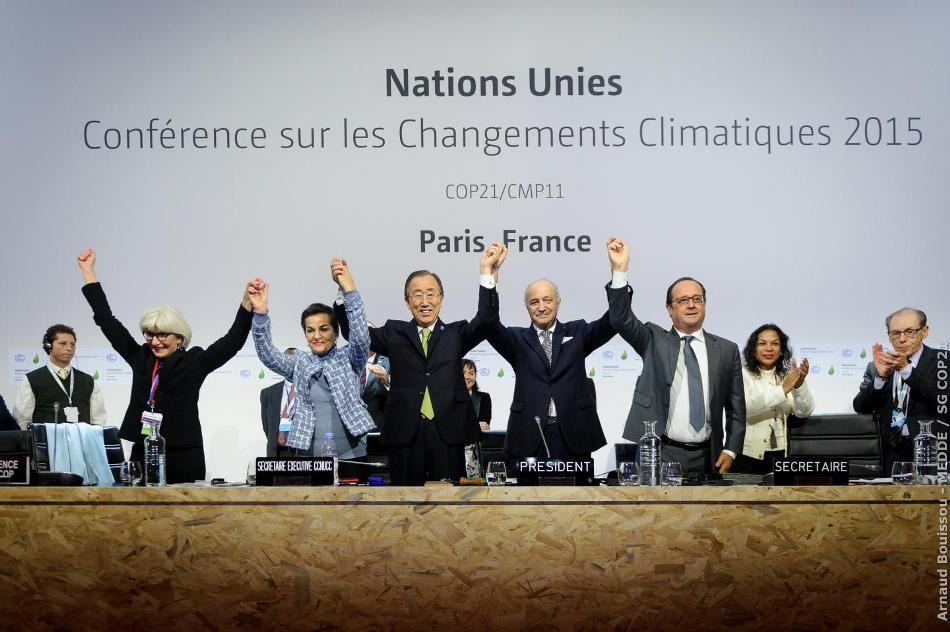May 31 2019
When the Paris Climate Agreement was adopted in 2015, expectation was high. Under the agreement, nations pledged to maintain global warming well below 2 °C. However, five years later, the state of affairs is sobering: international emissions of carbon dioxide (CO2) and other climate-pertinent gases continue to increase. In an article in Science magazine, Mark Lawrence and Stefan Schäfer of the Institute for Advanced Sustainability Studies (IASS) contend that the centralized method to looking at global warming has been futile and only greater democratic engagement can revive global climate politics.
 Achieving ambitious global temperature goals appears increasingly implausible but the Paris Agreement, agreed in 2015, nevertheless offers hope by promising a more democratic climate politics. (Image credit: Arnaud Bouissou/COP Paris/CCO 1.0)
Achieving ambitious global temperature goals appears increasingly implausible but the Paris Agreement, agreed in 2015, nevertheless offers hope by promising a more democratic climate politics. (Image credit: Arnaud Bouissou/COP Paris/CCO 1.0)
Temperatures are continuing to rise, CO2 levels are setting new records every year, and it is becoming increasingly unlikely that we will succeed in even meeting the 2 °C goal.
Mark Lawrence, Researcher, Institute for Advanced Sustainability Studies
The global community originally fixed its sights on curbing warming to 1.5 °C, allowing for an additional 400 to 600 gigatons (Gt) of CO2 emissions. But with total CO2 emissions at more than 40 Gt per year and increasing, the global carbon budget for this goal will be surpassed within approximately ten years. Furthermore, if emissions continue at this rate, it will only require about another 15 years to touch the 2 °C target — simply put, the international community is presently on a trajectory to surpass the 2 °C limit by approximately 2045 or shortly afterward.
According to the two specialists, states have stuck on to impractical scenarios for too long to achieve global goals, wherein, for example, methods for the capture and storage of CO2 (Carbon Dioxide Removal, CDR), also stated to as negative emissions, play a lopsided role. "The development of CDR is not expected to reach a point where these techniques could remove CO2 from the atmosphere on a climate-relevant scale until the middle of this century," explains Prof. Lawrence, "However, in order to keep temperature rise below two degrees, we need to reduce climate-harming emissions to zero already by 2050." The two authors recognize "a problematic reliance on future technologies" that remain unverified at the scales required to influence the worldwide climate system.
Prepare for temperature rise of over 2 °C
Lawrence and Schäfer debate that while global climate goals offer countries a means of orientation and of assessing measures to alleviate climate change, this abstract and centralized system has been unsuccessful in providing a satisfactory basis for the development and execution of efficient measures to stop global temperature rise. The human race must now ready itself for a future wherein worldwide temperature rise will in all likelihood go beyond the 2 °C target, they conclude.
The system of Nationally Determined Contributions (NDCs), set up by the Paris Agreement, provides a more favorable route, the authors propose, as it opens new opportunities for democratic engagement.
The democratic character of the Paris Agreement acknowledges the diversity of local contexts. And provides a means to reanimate global climate politics and advance transformation processes at more local levels. A more democratic politics will also enable us to cope better in a world in which global warming eventually does exceed the 2 °C target.
Stefan Schäfer, Researcher, Institute for Advanced Sustainability Studies